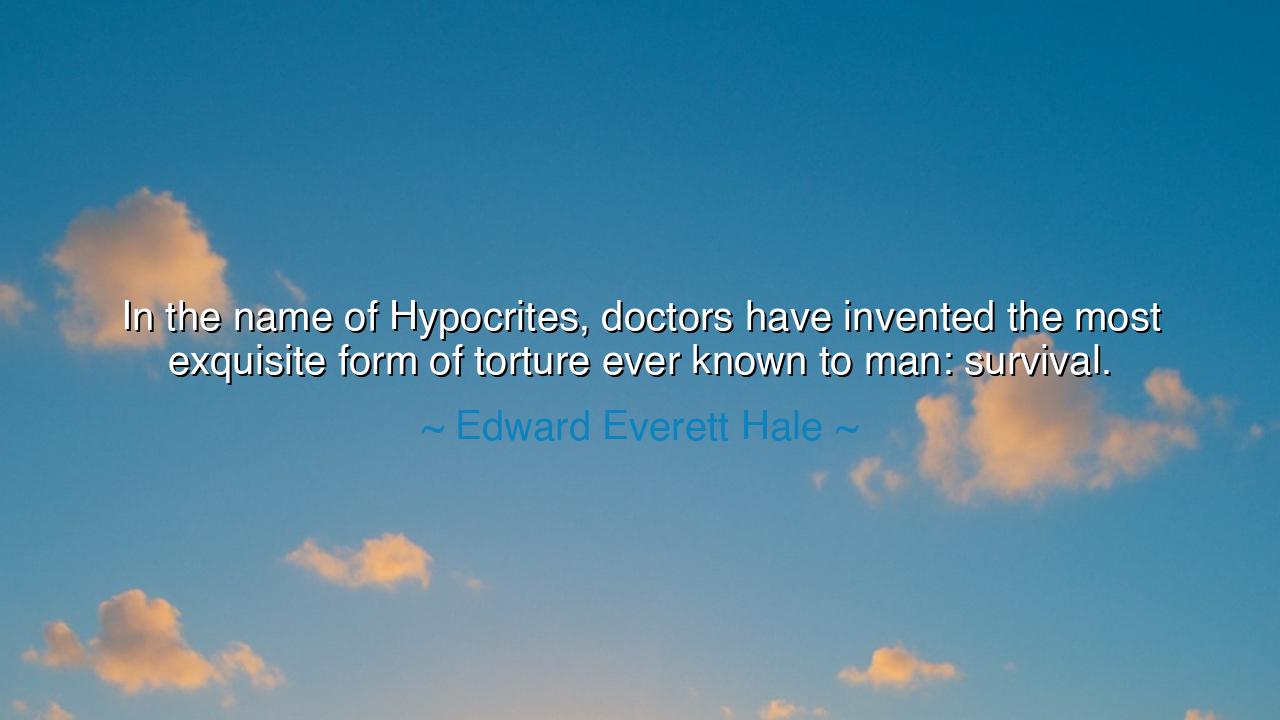
In the name of Hypocrites, doctors have invented the most
In the name of Hypocrites, doctors have invented the most exquisite form of torture ever known to man: survival.






In the annals of human existence, few experiences are as profoundly human as the struggle between life and death, and perhaps none more poignantly captured than in the words of Edward Everett Hale: "In the name of Hypocrites, doctors have invented the most exquisite form of torture ever known to man: survival." With these words, Hale dares to challenge the very foundations of medicine and its role in the human experience, drawing a line between the noble intentions of healing and the sometimes cruel consequences of clinging to life at any cost. It is a statement that forces us to confront the tension between the preservation of life and the suffering that often accompanies it.
The ancients knew well the frailty of the human condition, and they spoke of it with both reverence and caution. Hippocrates, the father of modern medicine, is often remembered for his Hippocratic Oath, a solemn promise to "do no harm." Yet, even Hippocrates recognized the delicate balance between healing and the inevitable limitations of the human body. In this sense, Hale’s words are a modern reflection of the ancient wisdom: sometimes, the effort to preserve life can, in itself, become a form of suffering, especially when the quality of that life is compromised.
The notion of survival as a form of torture is not a new one in human thought. The ancient Greeks had a word, "bios," which meant life, but it also signified mere existence—the simple act of breathing and moving through time. To live in such a manner was seen by some as a curse, rather than a gift, especially when life was spent in suffering or without purpose. The Stoics, such as Seneca and Epictetus, often spoke of the pain of prolonged life, suggesting that it was better to live a life of virtue, guided by reason and wisdom, than one filled with endless pain and self-indulgence. Hale, in echoing this sentiment, asks us to consider the exquisite torture of survival when it is lived without dignity or without a meaningful existence.
Consider the tragic story of Socrates, who, when faced with the death sentence, chose to die rather than live in a world where he could not speak his mind freely. In this, he gave us a profound example of the Stoic belief that death, when it comes from a life lived in pursuit of truth, was preferable to a long life filled with compromise and fear. Socrates did not see death as an end to life, but as a release from the suffering of being forced to live without integrity. In the same way, Hale’s quote challenges us to reflect on whether the pursuit of survival, in certain circumstances, becomes a greater burden than the release of death itself.
Yet, Hale’s words also underscore a deeper, more painful reality: the role of doctors in this dynamic. While they are often revered for their healing powers, they are not infallible. At times, the medical profession can be blinded by the desire to preserve life at all costs, without regard to the quality of that life. The ancient Romans, in their stoic wisdom, often pondered the role of fate and free will in the context of life and death, asking whether humans had the right to fight against nature’s course. When medicine forces survival beyond a person’s natural limits, we risk transforming life into a form of endless suffering—a torment that no one, not even the most well-intentioned healer, can avoid.
The lesson Hale imparts is one that calls us to consider the nature of life, death, and humanity itself. If survival is merely the extension of suffering, what then is the value of that life? The ancient philosopher Aristotle spoke of the "good life" as one where flourishing was the ultimate goal—not simply living, but living well, with purpose and meaning. Hale reminds us that sometimes the quality of life is just as important as its mere continuation. A life lived in misery, prolonged unnecessarily, is no gift at all. It is, in fact, a slow torment.
As we confront the realities of illness, aging, and death in our own lives, we must reflect on the wisdom of both the ancients and Hale’s provocative words. Are we living, or are we merely surviving? Are we allowing medicine to preserve our existence at the cost of our dignity, our freedom, and our peace of mind? The lesson is not to abandon the pursuit of life but to ensure that it is a life worth living—one filled with meaning, integrity, and wisdom. Let us approach the sacred art of healing with both reverence and humility, acknowledging that sometimes, the most compassionate act is not to extend life, but to allow a person to pass in peace, free from the torturous grip of survival for survival’s sake.
The true challenge of medicine, and of life itself, is to find that balance between healing and harm, between preserving life and respecting the natural course of existence. Hale’s words are a reminder to us all to seek not just survival, but a life well-lived, where we embrace the beauty of each moment and accept the inevitability of death with grace. Only through this balance can we find the peace that so many seek but few attain.






AAdministratorAdministrator
Welcome, honored guests. Please leave a comment, we will respond soon